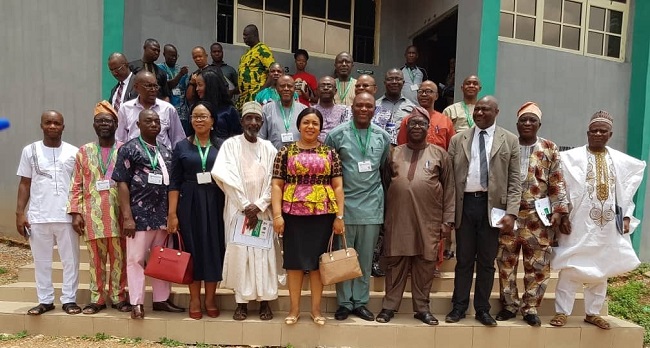The Alex Ekwueme Federal University (AE-FUNAI) in Ndufu-Alike, Ebonyi State, southeast Nigeria, has established a Centre for Climate Change and Development.

This disclosure was made by the institution’s Vice-Chancellor, Prof. Chinedum Nwajiuba, at a Roundtable on the “Way Forward for Nigeria after the Katowice Climate Package” held on Tuesday, March 19, 2019.
The Roundtable was the first major engagement of the Centre.
On what informed the need for the Centre, Prof. Nwajiuba stressed that the idea is to have a platform to reach out to technical as well as non-technical stakeholders on the subject, including policy makers and the people who, according to him, are simultaneously contributing and bearing the brunt of climate change, often without realising their place in this.
His words: “While the Centre will be engaged in the commonly understood responsibilities of researching, publishing, conferencing, others for which universities are known, it shall go further to engage stakeholders for action. Despite years of research and policy efforts, at the global level, it is obvious that many people globally do not yet locate themselves in the matter and the way their actions may be impacting the climate and other livelihood, and development.
“The Centre will have an action-soliciting and engendering component, based on the principle that the global climate challenge is a multi-stakeholder matter, and not the preserve of researchers and policy-makers. Further, AE-FUNAI is on the verge of having an Institute on Sustainable Development. This shall be a multidisciplinary platform, which recognises that the challenges we face do not fit into specific disciplines as with the common structures in our universities.
“It is therefore a season of action, and we shall not be left behind in the required actions necessary to sustain the world we have known, and the world God gave us to manage. Going forward and providing direction for action for our country, is the main purpose for our being present here today.
“It is in connection with this that the Centre for Climate and Development of AE-FUNAI is hosting this one-day roundtable to engage key stakeholders (government, academia, private sector, NGOs) in the climate discourse on the outcomes of COP24 especially on the agreed rules to implement the Paris Agreement and NDC. The roundtable will also interrogate the overall Country’s performance on the implementation of the NDC. We shall develop an action requirement at the end of this exercise for all stakeholders to act upon.”
Nwajiuba emphasised that the university exists to generate and disseminate knowledge.
His words: “In the three aspects of teaching, researching and serving the community, the University should not be indifferent to the challenges of the time and problems confronting society. Our position as a concentration of intellectuals recommends that we be engaged in providing leadership and direction to society. We locate this roundtable on the way forward for Nigeria post-COP24 held in Katowice. Poland, December 2018, in the context of providing intellectual leadership, and direction.
“AE-FUNAI takes these issues very seriously. We not only talk, but we walk the talk. At Katowice, several universities from across the globe were present. There were about four countries we could count from Africa that had universities present at Katowice. These included universities in South Africa, Ethiopia, Egypt, and Nigeria. From Nigeria however, only one University was present, and that is the AE-FUNAI. At Katowice, AE-FUNAI was not just in attendance, we hosted two side events.
“At home here our modest contribution to emission reduction and Nigeria meeting her commitments under the Paris Agreement and her Nationally Determined Contribution (NDC), we have embarked on a Campus Green Initiative. Under this we have planted 4,981 ornamental and fruit trees between mid-2016 and mid-2018. We also planted 704 m2 of grasses. Similarly, 10,000 stands of dwarf izora, ficus, west indies, etc. have been planted in hedges and flower beds.
“In addition, we have planted 342 stands of spot plants consisting of tuja pine (plicata), rose spp, pride of barbados, bougainvillea, queen of the philippines, hibiscus, flame of the forest, royal palm, etc. Various types of trees have also been planted. These include sundry species of the oil palm, mango, cashew, star apple (udara), almond, coconut, citrus, guava, hura, step tree, bread fruit and bush mango (ogbono).
“We achieved 424.4 tonnes of carbon dioxide supplanted by shifting from diesel to renewables, especially solar, apart from yet to be estimated carbon sequestration effect of our tree planting efforts in the last three years.” The Roundtable was graced by dignitaries like Prof. Emmanuel Oladipo of the University of Lagos; Dr. Peter Tarfa, Director of the Department of Climate Change in the Federal Ministry of Environment (who was represented by Ms Ann Umar); and Chukwumerije Okereke of the University of Reading/Alex Ekwueme Federal University.
